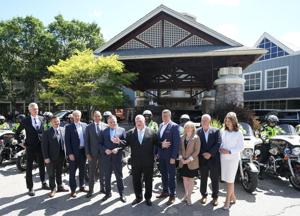Politics
Doug Ford Urges First Nations to Seize Financial Opportunities Amid Mining Legislation Concerns

In a bid to address the growing concerns of First Nations leaders, Ontario Premier Doug Ford encouraged Indigenous communities to capitalize on significant financial support available to them. This statement came as he prepared for a meeting on March 15, 2024, regarding legislation aimed at expediting mining projects in Ontario, which has faced criticism from various Indigenous groups.
During a media briefing prior to the annual Council of the Federation conference at Deerhurst Resort in Huntsville, Ontario, Ford emphasized the urgency of the situation. “This door is only open so long,” he remarked, highlighting the potential benefits for Indigenous communities. He noted that there is $3 billion in equity available, along with $70 million earmarked for training and $10 million for scholarships.
The discussions at the conference will involve leaders from the Assembly of First Nations, the Métis National Council, and the Congress of Aboriginal Peoples, focusing on the contentious Bill 5, formally known as the Protect Ontario by Unleashing Our Economy Act, and the federal counterpart, Bill C-5, the One Canadian Economy Act. Both pieces of legislation aim to remove barriers to major infrastructure projects, including pipelines and mining operations, in response to economic pressures from U.S. tariffs on Canadian imports like steel and automobiles.
The recent passage of these bills has sparked outrage among Indigenous leaders, who assert that there was insufficient consultation regarding their implications. They argue that the accelerated development threatens both traditional treaty rights and environmental protections. As a result, nine Ontario First Nations have initiated legal actions against both bills, claiming they are unconstitutional and seeking court injunctions to halt their implementation.
“Our rights cannot be implemented or respected without us, in substance and in process,” warned Cindy Woodhouse Nepinak, National Chief of the Assembly of First Nations, emphasizing the need for meaningful engagement in discussions that affect their communities and land.
Premier Ford is particularly focused on the economic potential of the Ring of Fire, an area rich in critical minerals essential for electric vehicles and other industries. He expressed a commitment to collaborate with First Nations, stating, “We’re gonna work with them. We want everyone to have an opportunity.”
In parallel, Prime Minister Mark Carney is set to join the premiers on March 16 to discuss trade negotiations with the United States and address Indigenous concerns regarding the federal legislation. Carney met with hundreds of Indigenous representatives the previous week in Gatineau, where they voiced similar apprehensions.
Some Indigenous leaders, such as Phyllis Whitford, Chief of the O’Chiese First Nation, have criticized the conference as “political theatre,” pointing to the rushed nature of the invitation and agenda. Alberta Premier Danielle Smith expressed her eagerness to learn more about the details of Bill C-5, stressing the need for efficiency in project approvals. “The problem has been, historically, that they haven’t moved at all,” she stated, advocating for a more expedited process while still recognizing the importance of thorough discussions.
As Ontario grapples with the balance between economic development and Indigenous rights, the outcomes of these discussions could have far-reaching implications for both the province and its Indigenous communities. The urgency of the situation reflects a broader struggle to reconcile economic ambitions with the protection of Indigenous sovereignty and environmental stewardship.
-

 Politics4 weeks ago
Politics4 weeks agoSecwepemc First Nation Seeks Aboriginal Title Over Kamloops Area
-

 World5 months ago
World5 months agoScientists Unearth Ancient Antarctic Ice to Unlock Climate Secrets
-

 Entertainment5 months ago
Entertainment5 months agoTrump and McCormick to Announce $70 Billion Energy Investments
-

 Science5 months ago
Science5 months agoFour Astronauts Return to Earth After International Space Station Mission
-

 Lifestyle5 months ago
Lifestyle5 months agoTransLink Launches Food Truck Program to Boost Revenue in Vancouver
-

 Technology3 months ago
Technology3 months agoApple Notes Enhances Functionality with Markdown Support in macOS 26
-

 Lifestyle3 months ago
Lifestyle3 months agoManitoba’s Burger Champion Shines Again Amid Dining Innovations
-

 Top Stories2 months ago
Top Stories2 months agoUrgent Update: Fatal Crash on Highway 99 Claims Life of Pitt Meadows Man
-

 Politics4 months ago
Politics4 months agoUkrainian Tennis Star Elina Svitolina Faces Death Threats Online
-

 Sports5 months ago
Sports5 months agoSearch Underway for Missing Hunter Amid Hokkaido Bear Emergency
-

 Politics5 months ago
Politics5 months agoCarney Engages First Nations Leaders at Development Law Summit
-

 Technology5 months ago
Technology5 months agoFrosthaven Launches Early Access on July 31, 2025




















